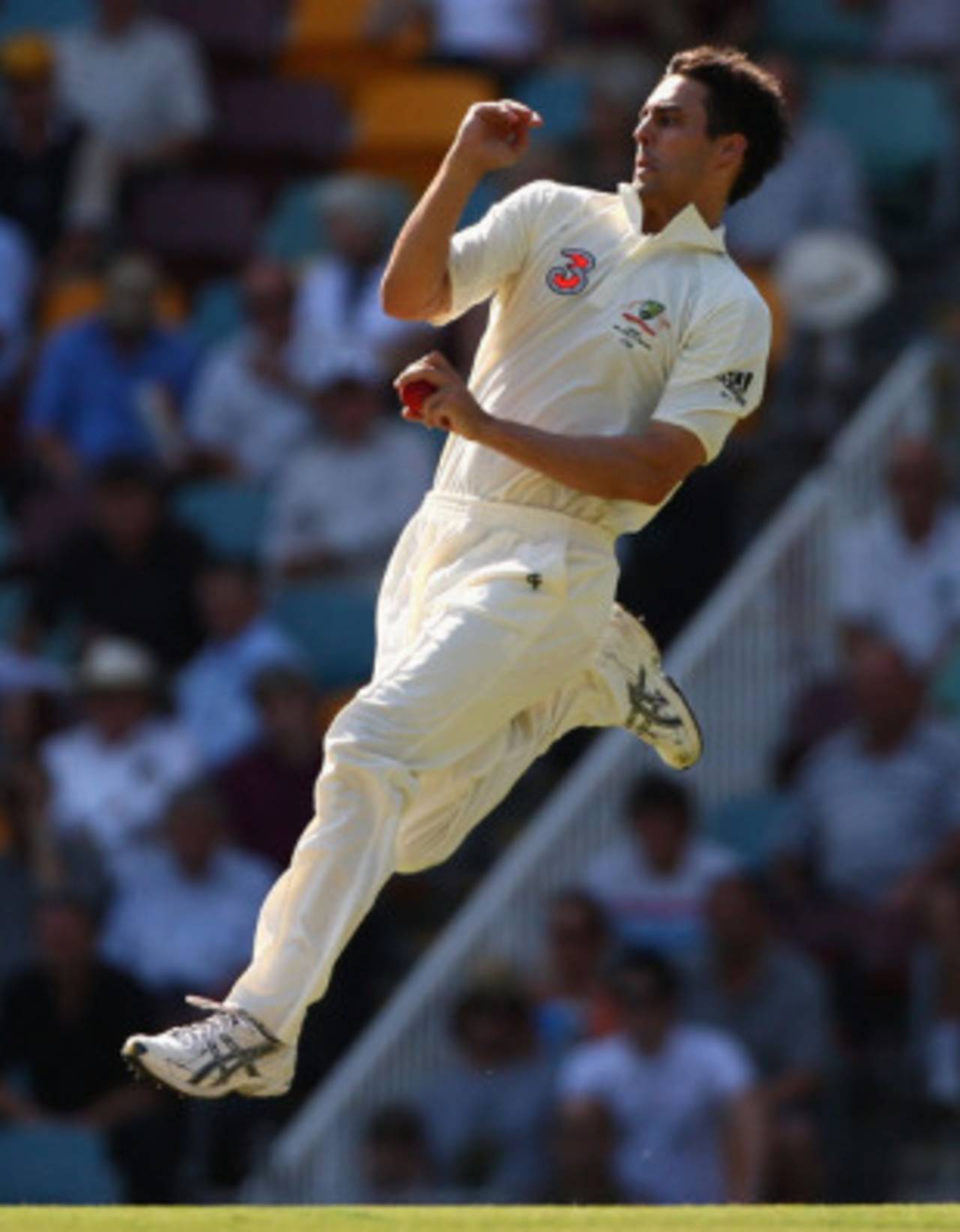Uncertainty keeps the rivalry thriving
Sehwag holds the key to India's chances against Australia. Much will also depend on Zaheer and Johnson
Ian Chappell
26-Sep-2010

Mitchell Johnson has often struggled on pitches with less bounce • Getty Images
As India and Australia prepare to meet in a much-anticipated Test series, the first thing that strikes you is how vulnerable Ricky Ponting's team is against good spin bowling. If this was 2001, when Harbhajan Singh was at the top of his game, it's hard to see how Australia could win. However, this isn't 2001 and Harbhajan is not the attacking force he was nine years ago. Consequently Australia's chances are much improved.
Apart from Michael Clarke, all the Australian batsmen are vulnerable, in varying degrees, to good spin bowling. Because Clarke is confident in his footwork right from the beginning of an innings, he's a better starter against spin than the rest of his team-mates.
If Ponting, Shane Watson, Simon Katich and Michael Hussey overcome that hurdle, India's fragile attack will be hard put to stop them. If all the batsmen in this series are in peak form, there's very little difference between the two line-ups, except for one man - Virender Sehwag.
Along with the form of the Indian bowlers, Sehwag holds the key to MS Dhoni's team winning the series. If Sehwag successfully launches a couple of his blitz attacks against the new ball, not only will it be difficult for Australia to recover, it'll also be an enormous boost to the batsmen who follow.
Any planned Australian bumper barrage will be short-lived if Sehwag is splattering balls against the advertising hoardings. In addition, this is not a greenhorn batting line-up: apart from Suresh Raina, the Indian batsmen have shown on many occasions that they can handle whatever the opposing fast bowlers deliver.
This promises to be a fascinating series, not just because it pits two intense rivals against one another but because there's also the heightened anticipation caused by uncertainty. Along with Australia's fragility against good spin bowling, the form of India's attack is currently a doubtful quantity.
India's chances of winning the series will hinge on Zaheer Khan, who is the class bowler in their line-up. However, Zaheer's injury history and bowling form in the Champions League must have Indian fans chewing their nails. If Zaheer can regularly break through with the new ball, then it makes the rest of the attack so much more effective. If, on the other hand, he struggles, and Katich and Watson give Australia strong starts, it will put a huge strain on the rest of the Indian bowlers. It will also increase the likelihood of Australia's middle order firing, and if they post big totals, this in turn will make their bowling line-up more potent.
For years Australia have put enormous pressure on their opponents by posting big totals. Even though it doesn't happen as often now, they still know how to turn the screws once they attain a position of strength.
Tendulkar has always relished his battles with Australia and has often played a decisive role. It's no coincidence that ever since Tendulkar arrived on the scene this rivalry has grown in intensity
The Australian attack relies heavily on pace, with steady assistance from offspinner Nathan Hauritz. Mitchell Johnson is the spearhead of the attack but he struggles on pitches with less bounce. Australia need him to adapt quickly to Indian conditions.
The other interesting aspect of this series is the Sachin Tendulkar factor. Tendulkar has always relished his battles with Australia and has often played a decisive role. It's no coincidence that ever since Tendulkar arrived on the scene this rivalry has grown in intensity. Just as Sunil Gavaskar gave Indian fans pride in their batting, Tendulkar has continually given them something to boast about. He's also featured in many opposition bowlers' nightmares; his was the wicket that meant the most. These days Sehwag has supplanted him in that regard, but if the ebullient opener is dismissed cheaply, there's still hope for India because Tendulkar follows. Even though he has reached senior-citizen status as a cricketer, of late Tendulkar's batting has featured a youthful spark. Nothing better to fan that flame than the thought of one last victory at home against the Australians.
After a month of speculation and innuendo about fixing, and the odd moment of downright stupidity, the game is in dire need of a positive boost. This series could well provide a bit of competitive relief; that is, provided either side has the bowling resources to push through to victory.
Former Australia captain Ian Chappell is now a cricket commentator and columnist